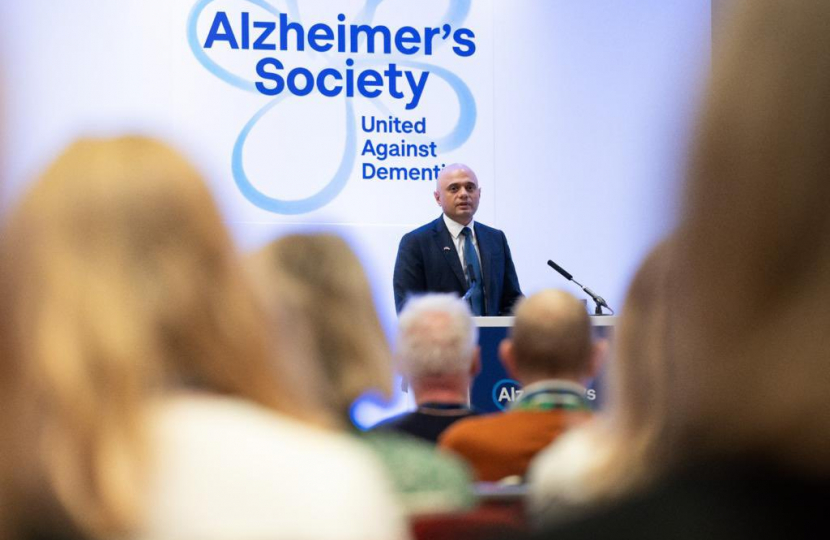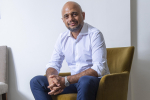
Delivered on: 17 May 2022 (Transcript of the speech, exactly as it was delivered)
Thank you Gina – not just for your warm introduction, but for everything you do, raising awareness and supporting other people living with dementia. Thank you very much.
And I’m also grateful to the Alzheimer’s Society for bringing us all together this afternoon.
I can’t begin to reflect on what the future holds without acknowledging the challenges of the past 2 years. Whether it’s the people living with dementia, or those around them who love and care for them, I know dementia is difficult at the best of times. The pandemic made it doubly difficult.
Dementia made some of the steps we needed to take to combat the pandemic a lot harder: like extra handwashing or socially distancing. Or families and carers, who had very little respite.
But I know it’s the emotional side that’s proved toughest over time. It runs deeper than the smiles and hugs we all missed.
Many of you have tirelessly smashed the taboos around dementia – like the idea dementia is a hidden disease. Lots of you – people like Gina – are proof that people with dementia shouldn’t be hidden away from society.
But sadly, the pandemic saw us all spend more time behind closed doors, physically separated from society and the people that we love.
So I want to say a huge thank you to all of you, for your tremendous courage and resilience in the most extraordinary of circumstances.
When I accepted this role nearly a year ago, I made it my priority to safely remove so many of the restrictions around COVID. Burdens that kept us apart through these difficult times. We’re now leading the world in learning to live with COVID, and I’m proud of how far we’ve come.
Yet even with these brighter days ahead, I know it will take some time for us to recover from this collective trauma. And, of course, the challenges of conditions like dementia haven’t gone away.
Over 900,000 people in the UK are believed to be living with dementia. In 2020, it was the leading cause of death (in England and Wales) after COVID-19.
Yet even when we’re faced with such stark statistics, it’s important to remember how we got here.
Economic growth, medical breakthroughs and vastly improved health and care services have seen life expectancy increase by more than a decade in our lifetimes. It’s one of the great triumphs of the 20th century. We’re all living longer.
If we’re to get the 21st century right, we need those extra years to be spent in good health.
And sadly that’s not the case for too many people. By 2025, 1 million people in the UK are expected to have dementia, and is expected to rise to 1.6 million by 2040.
There has been some great progress in recent years.
David Cameron used the rotating chairmanship of the G8 to convene the world’s first G8 dementia summit – which took the dementia challenge onto the global stage. And that passion for global action against dementia has continued in his current role as President of Alzheimer’s Research UK.
And I do want to pay tribute to David, because I remember very well when I was in his Cabinet: he dedicated an entire cabinet session to dementia and invited Alzheimer’s UK to speak to us. They enrolled us all as ‘dementia friends’, and even all these years later now I’m Health and Social Care Secretary, I still reflect on what I learned back then.
The Challenge on Dementia 2020 was another landmark piece of work, which saw a million care workers and a million NHS workers receive dementia awareness training. Over the 5 years of the strategy, the government invested some £420 million on dementia research.
But the pandemic has stemmed the tide of progress. Despite the best efforts of the NHS, it became harder for some people to get a timely diagnosis, because the pandemic made it more difficult to access memory assessment services. I know the Alzheimer’s Society has estimated over 30,000 people didn’t receive a diagnosis because of the pandemic.
Equally, we know from your brilliant research that tens of thousands of people are still missing out on a dementia diagnosis each year because they confuse key symptoms with getting old. As you say: “It’s not called getting old, it’s called getting ill”.
So, while these broader demographic trends, combined with the rising prevalence of dementia, were always going to take us to a crossroads – a moment where we’d have to rethink how we do health and care in this country – the pandemic has brought us to these crossroads a lot more quickly. In fact, we’re there right now.
I think one of the reasons why we haven’t made as much progress on dementia as we would like is because it’s going to take some pretty seismic shifts, both in terms of the architecture of health and care and our own approach.
That’s hard to do. Reform takes time. And you need to take people with you. But it’s a journey we’ve already begun – and it’s a challenge this government is unafraid to take on.
Our plans for adult social care will help improve experiences for people with dementia and their families: with a far more generous means-testing, a cap on life-time costs to increase support and development for our phenomenal workforce.
The new Health and Care Act – which received Royal Assent just a couple of weeks ago – puts integrated care boards and integrated care partnerships at the heart of our system. Joint working and joint budgets will be directed towards caring for people and keeping them well in the first place.
You may also know that we asked Claire Fuller – a GP and Chief Executive of Surrey Heartlands – to conduct a stocktake of how primary care works within the new system. Now this is important, because we know that primary care is where the bulk of prevention can happen – and GPs play a crucial role in referring people with early signs of dementia. So I’m looking forward to hearing Dr Fuller’s views.
We know that joined up care is better for people with dementia and their families. Implementing the proposals in our integration white paper will be another important part of what we need to do. The white paper looks at everything from better data-sharing to multidisciplinary working across health and care, with the ambition of improving the experiences of those who use our vital services.
All of this taken together means our future work on dementia is going to take place in a very different health and care context – one which is much more preventive, professional, and joined up.
Not only that, but the combination of the demographic shifts we all know are coming, the setbacks of COVID-19 and the incredible opportunities afforded to us by pioneering research and new technology, mean we now need to do something dramatically different. We have no other choice but to step up and rise to this moment.
So that’s been the spirit behind our new dementia strategy, which we began developing last summer. I’m grateful to everyone who’s played a part and continues to play a part in bringing it to life, including the Alzheimer’s Society. That work is still ongoing, but today I want to tell you a bit more about what it will look like.
In short, I want it to be more ambitious than anything we’ve done before. To begin with: I want our dementia strategy to be a 10-year plan, not just 5. Because we can only get to grips with long-term challenges by thinking long-term.
I’d like us to be as bold as we’ve been with our 10-year plan for cancer. It will be driven by the same 4 themes behind our reforms in health and care – what I call the ‘4 P’s’: prevention, personalisation, performance and people.
Let’s look at prevention for a moment.
It’s estimated that as much as 40% of dementia is potentially preventable. 40%.
We now know that what’s good for the heart is also good for the brain. Action on high blood pressure, physical inactivity, alcohol, obesity and healthy eating all have a part to play.
So we’re going to be very ambitious on prevention, because I don’t accept that dementia is an inevitable part of ageing. It isn’t.
We’re going to be equally ambitious on research.
We’ve already committed £375 million into research on neurodegenerative diseases over the next 5 years – and I’ll work across government to boost this further.
It means measuring ourselves against the leading countries globally and being unafraid to find new ways of working. It means being bold about finding new medicines and new treatments. It means being ambitious on new technology, like genomic sequencing and digital biomarkers. And it means continuing to smash taboos – just as you do so brilliantly, every single day.
So I’m really excited about this – and I’m excited to work with all of you get it right. Because it’s no exaggeration to say that our future depends on it.
We’re at the crossroads. All of us here today, we understand the challenges that lie ahead. When it comes to dementia, we know there have never been any quick fixes. We know there aren’t any easy wins.
But we also know that when a visionary plan comes together, with powerful partners and proper funding – and we couple it with care and compassion – that combination can be unbeatable.
That’s going to be the mission – and I’m grateful to have partners like you to share it with. Thank you.

